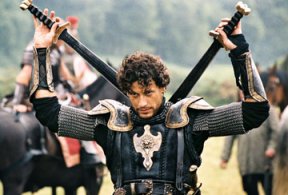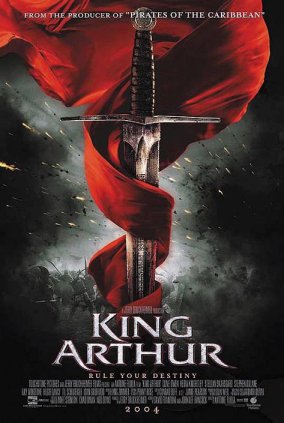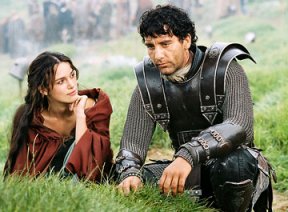|
King Arthur
Forget
all that clunky shining armor. Forget the Holy Grail. It
turns out that King Arthur (Clive Owen) was actually a Roman
mercenary stationed in Britain, and instead of noble knights,
he had conscripted soldiers from Sarmatia. Was there actually
such a place? Must have been, because King Arthur
goes to such trouble to establish its historical veracity.
Yes, it's got
those very serious placards up front that tell you that
the take you're about to see could very well be true. At
least, truer than any of the medieval versions that we might
have loved. But in turning the clock on the legend back
a thousand years and steeping it in supposed accuracy, producer
Jerry Bruckheimer and screenwriter David Franzoni have lost
some of the magic, and no amount of Kiera Knightley can
get it back.
On the other
hand, the film still has lots of action, and by uprooting
it from the setting we know, it gives the story a sense
that anything can happen. Though Lancelot (Ioan Gruffudd)
and a couple of familiar knights still stand by Arthur's
side, the bulk of the personality belongs to Bors (Ray Winstone)
and Dagonet (Ray Stevenson). Their antics get the most screen
time, while Galahad, Tristan and Gawain are interchangeable.
Lancelot occasionally
narrates, again to give the story seeming verisimilitude.
Somebody had to explain the Sarmatians, a concept of great
concern to both the Roman Empire and the invading Saxons,
led by Cerdic (Stellan Skarsgard, almost unrecognizable
in braids, beard and Brando/Busey impersonation). Each Sarmatian
owes the Empire fifteen years of service, and when we see
these men after a terrific bloody fight with the natives,
it is literally the last day of their service.
Or
would be, if Rome really lived by the ethics that Arthur
believes it to have. Instead, Bishop Germanius (Ivano Marascotti)
has a deal we've seen in hundreds of Westerns and war movies:
if the knights make a suicide run to the northern end of
Britain, where the savages under Merlin's command have control,
any survivors will be granted their release. There's one
lonely little Roman outpost up there, with a boy beloved
by the Pope, and those citizens have to be rescued. The
Knights of the Round Table (at least that's still
here) are stuck between Woads (the natives) and the marauding
Saxons, who evidently subscribe to the Necromongers creed:
Keep what you kill.
 |
As a mindless
action movie, it works surprisingly well. Director Antoine
Fuqua stages a couple of real corkers. In particular, a
tense showdown between the knights and the Saxons on a lake
of ice should have you on the edge of your seat. It's even
done pretty believably, also taking a moment to prove that
Arthur (also called Arturius) is the brilliant military
strategist everybody keeps saying he is. Further to Fuqua's
credit, he makes credible the victories of the few over
the many.
But he also
often sacrifices the flow of scenes for the coolness of
a shot. In a confrontation between Arthur and Merlin (Stephen
Dillane), the lighting careens wildly from warm amber to
cold blues, depending on the angle, and this is in a densely
wooded forest, at night, with no fire. However, the moon
doth wax full, so perhaps that was it.
Also, do not
look too closely at what purpose exactly Guinevere (Knightley)
serves. After a rescue from a dungeon, in which she maintains
her beauty quite well for being starved and tortured, she
does a lot of sexual taunting. It's out of time and place;
as an actress, Knightley does a great job of playing what
she actually is, and that kind of innocent knowing seems
so twenty-first century. At times, she even seems to be
channeling Tim Curry in The Rocky Horror Picture Show.
Furtive glances
dart back and forth between Guinevere, Lancelot and Arthur
without any actual conflict developing. Clearly, the meat
of this story is about action, and the closest it can get
to emotional complexity is Arthur's dogged insistence that
all men must be free. True enough, but it gets lost in the
clanging of swords and the lopping off of limbs.
Franzoni does
try to add some depth, mostly in Arthur's internal conflict.
As a Roman Citizen, he considers himself Christian, but
realistically that often brings him into ideological clashes
with his best friend, the pagan Lancelot. Realizing that
the Rome he holds up as a symbol of virtue no longer exists,
the man who would be King struggles to hold onto his faith.
Ultimately, he must forge it into something new, but again,
it takes a backseat to blood and guts.
This summer
has given us a Trojan War stripped of mythology, and a King
Arthur devoid of wonder. Both were entertaining enough,
but I have to ask - can we get back to what made us love
the stories in the first place?
Rating: 
|








